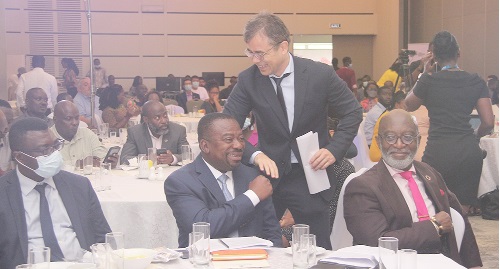
Constructive efforts needed to bridge housing deficit - Yofi Grant
The Chief Executive Officer (CEO) of the Ghana Investment Promotion Centre, Yofi Grant, has called for strong collaboration among stakeholders in the housing space to help bridge the country's over 1.8 million housing deficit.
He explained that the efforts should precede the creation of a robust housing industry that thrive on a solid policy with inputs from all stakeholders.
Advertisement
Opening a breakfast meeting by the GIPC- United Nations Development Programme in Accra, Mr Grant said the most compelling evidence of progress in an economy was housing and shelter because housing was a critical element of development.
"We have got to a point where we need to engage constructively to build a housing industry that will serve the people and bring hope for prospective home buyers," he said.
The breakfast meeting brought together various stakeholders to identify and explore cooperative action plans for attracting investments to bridge gaps in the housing and infrastructure sectors.
It hosted speakers such as CEO of the National Home Ownership Fund, Dela Zumanu; Managing Partner of KPMG, Risk Consulting, Kwame Barnieh, and CEO of Saka Homes, Kwadwo Saka.
Focus on housing
Mr Grant noted that for the country to bridge its infrastructure gap, it needed approximately $9.3 billion every year with 20 per cent directed to the housing sector.
“It means that there is a need for significant investment in the infrastructure and housing sector.
“Inasmuch as the government was committed to focus on infrastructure such as roads and railways, housing is very important,” he said.
Little impact
A Director at the Ministry of Works and Housing, Rev. Stephen Yaw Osei, stated that attempts by successive governments to address the housing needs of the citizens had had little impact.
He said the housing sector had not adequately met the housing needs of the masses especially the low-to-middle income groups.
That, he said, had resulted in a housing deficit currently estimated in excess of 1.8 million housing units.
He said that had made accessibility and affordability the key factors affecting the housing sub-sector in the country.
“The 2021 Population and Housing Census report on housing characteristics has revealed that approximately 12.7 per cent of the total structures counted were vacant housing units, giving a clear indication that our housing supply has outpriced the average person in Ghana and failed to address the housing needs of a significant segment of our society,” he said.
He said statistics revealed that 60 per cent of Ghana’s urban population would need some form of government intervention to support them get access to housing
He said there was the need for direct government support to provide housing targeted at the 60 per cent urban population in short to medium term and the remaining 35 per cent in the long term.
Infrastructure growth
The Deputy United Nations Development Programme (UNDP) Resident Representative in Ghana, Sukhrob Khoshmukhamedov, stated that numerous studies including ones conducted by UNDP had proven that infrastructure growth and services could play a critical role in economic growth and poverty reduction-and also enhance human security, particularly of poor people
This, he said, could be done by contributing to their food security, job security, health security community security, personal security, and environmental security.
“Today we are here to look at the emerging investment opportunities in the areas of housing and infrastructure.
“According to the Ministry of Works and Housing, Ghana has a housing gap of about 85,000 housing units yearly, and this number is on the rise with an average annual population growth rate at 1.9 per cent,” he added.



